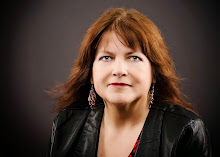Rebecca--Unless I'm reading an Agatha Christie book, it really bothers me to have a villain explaining the whole scenario at the end. It seems unnatural. (And hey, let's face it, real bad guys don't usually spill everything when they're caught. They say, "Hey, I didn't do anything," even if the smoking gun is still in their hand. Or they say, "I want my lawyer, now.")
As a writer, I try to reveal as much of the puzzle as I can in bits and pieces along the way, so that when the ultimate bad guy is caught, he doesn't have to go into a long monologue--but maybe he can provide that one final piece of the puzzle that allows everything else to click into place.
Kara Lennox
BOUNTY HUNTER HONOR, Harlequin Intrigue, June 2005
www.karalennox.com
Wednesday, June 08, 2005
Subscribe to:
Post Comments (Atom)




Yeah, I'd much rather not know the motivations sometimes then have it all dumped at the end. Little hints along the way are the best.
ReplyDeleteYes, but suppose a major plot element is that the villain arranged to trick the heroine into leading the hero to a location where he can kill him. She thinks she has perfectly legitimate reasons for doing what she does. Then she finds out that she's been masterfully manipulated. I can't explain any of it as I go along because then the horror of the ending is spoiled. When the villain tells the heroine what she's done for him--she's destroyed. If I let the reader in on the secret before the end, then the impact goes away.
ReplyDeleteI said it's at "the end." It's about fifty pages before the end--because then the heroine has to redeem herself, and she and the hero have to get out of the trap the bad guy laid.
I don't want the reader to know what's really going on while she reads the book. When she finds out what the bad guy has done, I want the reader to be able to go back to each major event and say--yeah, I get it now.
Oh well,
Rebecca
Rebecca--
ReplyDeleteThat sounds perfectly okay to me. Some explanation doesn't bother me.
where can i get more info?
ReplyDelete